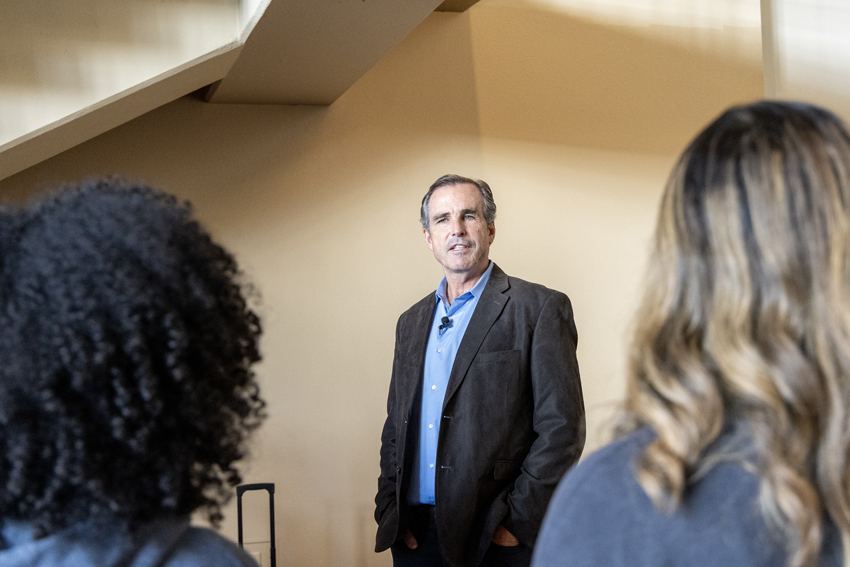In this occasional feature, members of The Feather staff will discuss college preparation and experiences with Academic Adviser Molly Sargent and special guests. This is the first installment in the series.
For many students, deciding between a public and private college takes a great deal of consideration. For students to gain a deeper understanding of academic life and the overall management of a Christian college, Gordon College Provost Mark Sargent offered me an insight into the school’s applications, values and inner-working.
Next year, Sargent, brother-in-law of Academic Adviser Molly Sargent, will leave Gordon to take over the position of provost at Westmont College.
Hierholzer: How much emphasis is put on an applicant’s SAT or ACT score, on their GPA and on their writing sample?
Sargent: Those are all important. They aren’t the only things we look at, but we are looking for intelligent students. The SAT standard depends on the institution: we are looking for good students here, and the SAT does tell us something about their intellectual aptitudes.
Hierholzer: What is the writing sample specifically used for?
Sargent: First of all, we want to see if they [the applicants] can write. Then, usually in the writing sample, they say something about their faith, so we’re interested in how they can express that. Gordon’s a place that does not have a litmus test where we wait to hear the right answer and then say ‘yes, you’re in.? Rather, we give a student and the faculty freedom to express their faith and evaluate they do with their freedom. So we’re interested in how they express their faith.
Hierholzer: Does an applicant’s home state or gender matter for admission at Gordon?
Sargent: I’ve never known us to exclude anybody based on the state they came from; it’s not like there’s a quota for each state. That would be different if you were talking to an Ivy League school, when they have an enormous pool of applicants to draw from and so are striving for some geographical diversity.
But we are interested in investing our resources in recruitment in different parts of the country, so the state breakdown is something very interesting to us in general. Both, for the individual student, it is important to know that we don’t exclude anybody based on the state they come from.
Hierholzer: What are the main differences between a Christian university and a secular one?
Sargent: Well, just the fact that faith is central to the way in which we think about education. We?re interested in having them really grow in their faith while they’re at college. I think the fact that it’s a priority rather than a tangent. Plus, you have faculty here who are Christian. That’s one of the biggest things that distinguishes a public college from a Christian college: all the faculty we hire are believers, so we expect that to form the way they think about their academic fields.
Hierholzer: What is the chapel philosophy at Gordon?
Sargent: We have mandatory chapel and we see chapel as a time that brings the community together for worship and for learning. Chapel is not exactly like a church. We have 40 or more denominations reflected in our student body, so we can’t have a chapel that reflects everybody’s or one compared to the other.
What we’re interested in using it as educational; not only do we bring people together to worship, but we also hope that they learn about different denominations and different traditions.
Hierholzer: How has the recession affected Gordon, if it has at all?
Sargent: It really has. It affected enrollment and, as a result, our budget. It affected fundraising. So it’s required us to tighten our belts and reduce our expenditures and we’ve had times where we’ve had to freeze salaries. So it did have a profound effect on us.
Hierholzer: What does a provost do?
Sargent: Good question. Maybe the best way to describe it is as the chief academic officer of the institution. So I have responsibility over the academic program: over the faculty and the curriculum. But I also supervise the dean of students, the dean of chapel, and the athletic director. And we try to make sure that all of those programs cohere in some way. We have a chapel program that can fit with our educational philosophy, and a student development program that can fit with our educational philosophy. So to make sure that it all fits together.
Hierholzer: How does a Christian college prepare its graduates for a world that doesn’t share its values?
Sargent: We talk a lot about vocation and calling. Gordon is not an oasis or a bubble. Gordon very much thinks about trying to get Christians engaged in the world and to think in new ways about how you serve within disciplines and professions. Nobody graduates from Gordon thinking that the world is going to share their values, but we talk a lot about how you remain faithful to your beliefs, how you exercise Christian conscience in what you have to do, and what our faith calls us to do in terms of being agents of the Gospel.
I have a phrase I use all the time when I talk about the primary task of the faculty here: that is, to “awaken the moral imagination of our students.” And that is that they need to be constantly thinking about a solution — they need to come to an imaginative solution to social problems, and those solutions often come out of a Christian point of view.
I really got the idea from a theologian out of Duke, who talked about the need to live in imaginative obedience to the moral vision of the New Testament. I love that language because it is suggests that obedience is not just simply following a certain set of rules or code that may line up with a religious subculture. You can’t be doing relief work anywhere in the world, you can’t be doing work in politics, you can’t be doing work in finance unless you’re imaginatively engaged in trying to find solutions to problems.
We try to prepare people to have a rich moral imagination.
Hierholzer: How does Gordon view its behavioral expectations and rules, especially when a student does not live up to or follow them?
Sargent: I think we’re understood to have a redemptive process. In other words, we see violations of disciplinary rules as opportunities for intervention to try to work with the student redemptively, but we draw a line at some point.
Hierholzer: So is there more of an emphasis on grace or enforcement, or just in between?
Sargent: Both. You don’t want a soft grace that looks away every time. We hold them [students] accountable for their actions, but as long as the student is working redemptively and willing to accept responsibility for mistakes we will often show grace. If you were to talk to a dean of students, he could flush it out in great more detail, but I know, for example, that he puts a great deal of value when students come forward and admit that they’ve violated something.
For more college information, read the Dec. 14, 2010 article, College Corner: Filing the FAFSA.







Mackenzie Devereaux • Jan 7, 2012 at 12:02 am
Yeah freshmen! We have improved SO much! Keep up the good work!